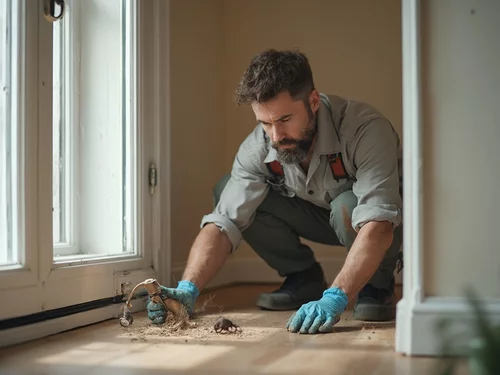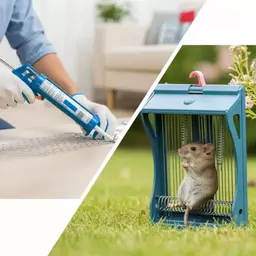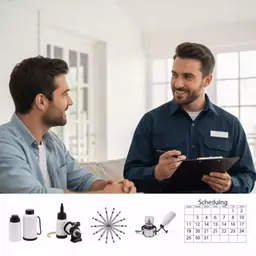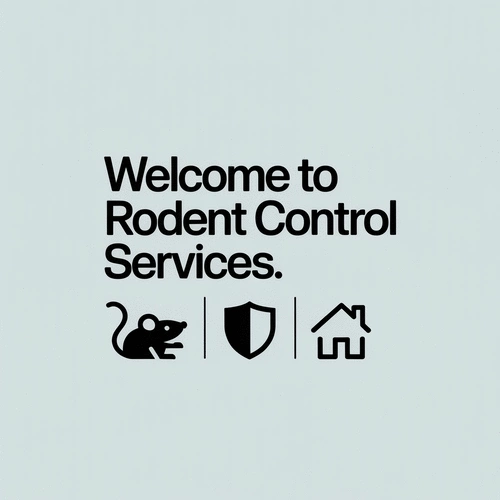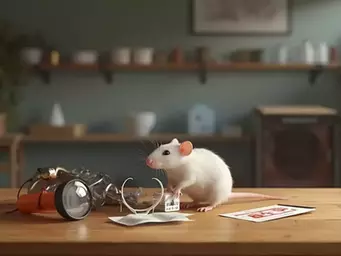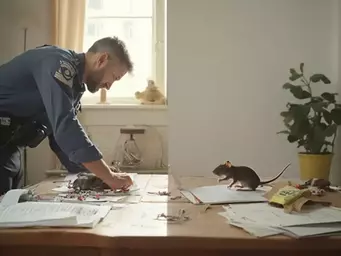Are you aware that a proactive approach is the most effective way to keep your home or office rodent-free? Understanding rodent exclusion services can empower you to take control of your environment and prevent costly infestations.
What You Will Learn
- Rodent exclusion focuses on preventing entry rather than just removal, making it essential for long-term pest management.
- Key techniques include sealing entry points, removing food attractants, and modifying habitats to deter rodents.
- Understanding the differences between rodent exclusion and removal can help you adopt a more effective pest control strategy.
- Common signs of rodent infestation include droppings, gnaw marks, and unusual sounds, which can help you identify issues early.
- When choosing pest control services, consider professional expertise versus DIY solutions to determine the best approach for your situation.
- Legal considerations, such as licensing and warranty policies, are crucial for selecting a reliable rodent exclusion service.
- Budgeting for exclusion services involves understanding initial costs, follow-up services, and potential discounts offered by service providers.
Rodent Exclusion vs. Rodent Removal: A Comparative Overview
Understanding the key differences between rodent exclusion and removal strategies is crucial for effective long-term pest management. This visual highlights their primary objectives, focus, and benefits.
Rodent Exclusion
- ✓ Objective: Prevent entry
- ✓ Focus: Proactive prevention
- ✓ Strategy: Seal entry points, physical barriers, habitat mods
- ✓ Outcome: Long-term solution, sustainable, cost-effective over time
Rodent Removal
- ✗ Objective: Eliminate existing pests
- ✗ Focus: Reactive pest elimination
- ✗ Strategy: Traps, baits, fumigation
- ✗ Outcome: Temporary solution, may require repeated treatments
Understanding Rodent Exclusion Services: What You Need to Know
When it comes to keeping your home or office rodent-free, understanding rodent exclusion services is crucial. These services focus on preventing rodents from entering your space, rather than just eliminating those that are already there. As someone deeply committed to educating my clients at Rodent Control Services, I can tell you that proactive measures are the key to long-term success!
Rodent exclusion isn't just about sealing up holes; it’s about creating an environment that’s inhospitable to these unwanted guests. By knowing what exclusion entails, you can better protect your property and avoid the costly repercussions of an infestation.
Defining Rodent Exclusion and Its Importance
Rodent exclusion refers to the techniques and strategies used to prevent rodents from entering your property. This includes sealing entry points, removing attractants, and implementing habitat modifications. It’s an essential part of any pest management plan because it helps ensure that rodents don’t just find their way back after removal. For more comprehensive insights into mechanical rodent proofing techniques, you can refer to the NPS Rodent Exclusion Manual.
- Identifying potential entry points
- Utilizing physical barriers
- Conducting regular inspections
By focusing on exclusion, we create a more sustainable and effective approach to pest management. Remember, it’s much easier to keep rodents out than to deal with an infestation later!
Key Differences Between Rodent Exclusion and Rodent Removal
While rodent removal deals with eliminating existing pests, exclusion focuses on prevention. Think of it this way: removal is like treating a symptom, while exclusion addresses the root cause. By investing in exclusion, you're taking proactive steps to safeguard your environment.
- Rodent Removal: Temporary solution, may require repeated treatments.
- Rodent Exclusion: Long-term strategy, aims to prevent future infestations.
It’s essential to see these two aspects as complementary. A comprehensive pest management plan incorporates both to achieve lasting results!
Health Risks Associated with Rodent Infestation
Did you know that rodent infestations can pose significant health risks? From diseases to allergens, these tiny intruders can create large problems for your living or working space. Rodents can carry diseases such as Hantavirus, leptospirosis, and salmonella, which can affect humans. The CDC provides valuable information on diseases carried by rodents and how to control them.
- Contact with droppings can lead to health issues
- Rodent-borne diseases can spread quickly in enclosed spaces
- Allergens from rodent urine and fur can exacerbate respiratory conditions
Being aware of these risks can motivate you to take action sooner rather than later. If you suspect a rodent issue, don’t hesitate to reach out for professional help!
Common Signs of Rodent Infestation and What to Look For
Recognizing the signs of a rodent infestation early can save you time, money, and stress. Here are some common indicators that rodents have taken up residence:
- Droppings: Look for small, dark pellets in areas where food is stored.
- Gnaw Marks: Check pantry items and wooden structures for signs of chewing.
- Nests: Rodents often create nests in hidden places, using materials like insulation or paper.
- Squeaking or Scurrying Sounds: Listen for unusual noises, especially at night.
Being vigilant about these signs can help you respond quickly to potential threats. If you notice any of these indicators, it's time to consult with a professional service like Rodent Control Services to take the necessary steps toward a rodent-free environment!
Pro Tip
To enhance the effectiveness of your rodent exclusion efforts, consider implementing a holistic approach that includes regular property inspections, proper waste management, and maintaining a clutter-free environment. These practices not only help in preventing rodent entry but also contribute to a healthier living space!
Making an Informed Decision: Choosing the Right Service for You
When it comes to rodent exclusion, making an informed decision is crucial! You might be wondering whether to hire a professional service or tackle the problem yourself. Each option has its advantages, but understanding the nuances can help you choose the best path for your situation.
On one hand, professional services bring expertise and advanced methods for effective rodent control. On the other hand, DIY solutions can be a cost-saving approach, but they often lack the thoroughness and efficacy that trained professionals provide. It's essential to weigh these benefits carefully as you consider your options.
Weighing the Benefits of Professional Services vs. DIY Solutions
Let’s break down the benefits of each option so you can make the best choice:
- Professional Services: Trained specialists like us at Rodent Control Services utilize proven techniques to effectively manage and exclude rodents. Our knowledge of local pest behaviors allows for targeted solutions.
- DIY Solutions: These can be a budget-friendly option. You can find resources online to help you tackle minor infestations. However, be aware that without the right knowledge, you might miss underlying issues or fail to eliminate the problem completely!
- Long-term Effectiveness: Professionals often offer guarantees on their work, ensuring that if rodents return, they’ll handle it at no additional cost. DIY solutions may not offer this peace of mind.
Ultimately, the choice between professional services and DIY solutions depends on your budget, the severity of the infestation, and your confidence in handling pest control.
Understanding Legal and Warranty Considerations in Exclusion Services
As you navigate your options, it’s important to consider legal and warranty aspects. Many states have specific regulations regarding pest control, so being informed can protect you from potential issues. For information on which governmental agencies are involved in rat and mouse control, you can consult the EPA's guidelines.
- Licensing: Always check that the pest control company is licensed in your state. This ensures they meet legal requirements and adhere to best practices.
- Warranty Policies: Look for companies that offer warranties on their services. This means if issues arise after treatment, they’ll come back to resolve it at no extra charge.
- Insurance Coverage: Verify that the service provider has liability insurance. This protects you in case of accidental damage during the exclusion process.
Being aware of these legalities ensures you’re safeguarded while receiving the best service possible!
Cost Estimates: Budgeting for Rodent Exclusion Services
Budgeting for rodent exclusion services can feel daunting, but it doesn’t have to be! I always recommend getting multiple estimates before deciding. Here’s what to keep in mind:
- Initial Costs: Be clear about what the service includes. Some companies may charge a flat fee, while others charge per hour or based on the severity of the infestation.
- Follow-up Services: Ask if follow-up visits are included in the initial cost or if they come at an additional charge.
- Cost-Saving Opportunities: Some providers offer package deals or discounts for long-term contracts. It’s worth asking about these options to help keep your budget in check!
By understanding the costs associated with rodent exclusion, you can make a more informed decision and take steps towards a rodent-free environment!
Frequently Asked Questions About Rodent Exclusion Services
Q1: What is the main difference between rodent exclusion and rodent removal?
A: Rodent exclusion focuses on preventing rodents from entering your property by sealing entry points and modifying habitats (proactive approach). Rodent removal, on the other hand, deals with eliminating existing pests through traps, baits, or fumigation (reactive approach).
Q2: Why is rodent exclusion considered more effective for long-term pest management?
A: Exclusion addresses the root cause of infestations by blocking access points, thereby preventing future entries. Removal only treats the existing problem, which might recur if entry points remain unsealed.
Q3: What are common signs that I might have a rodent infestation?
A: Common signs include droppings (small, dark pellets), gnaw marks on food packaging or structures, nests built from insulation or paper, and unusual squeaking or scurrying sounds, especially at night.
Q4: What health risks are associated with rodent infestations?
A: Rodents can carry diseases such as Hantavirus, leptospirosis, and salmonella. Their droppings, urine, and fur can also exacerbate respiratory conditions due to allergens.
Q5: Should I opt for professional rodent exclusion services or a DIY solution?
A: Professional services offer expertise, proven techniques, and often guarantees, ensuring thorough and long-term effectiveness. DIY solutions can be cost-effective for minor issues, but may lack the thoroughness needed to fully resolve an infestation and prevent recurrence.
Q6: What legal or warranty considerations should I look for when hiring a pest control service?
A: Always ensure the company is licensed in your state. Look for services that offer warranty policies for their work and verify they have liability insurance to protect you from accidental damages.
Recap of Key Points
Here is a quick recap of the important points discussed in the article:
- Rodent exclusion focuses on preventing entry rather than just removing existing pests.
- Key exclusion strategies include sealing entry points, removing attractants, and regular inspections.
- Understanding the difference between rodent exclusion and removal is crucial for long-term pest management.
- Health risks from rodent infestations include disease transmission and respiratory issues from allergens.
- Common signs of rodent infestation include droppings, gnaw marks, nests, and unusual noises.
- When choosing a service, consider the benefits of professional help versus DIY solutions.
- Be aware of legal considerations, such as licensing and warranty policies, when hiring pest control services.
- Budgeting for exclusion services is important; get multiple estimates and understand what each service includes.

